Astute readers of this newsletter may remember a previous episode, about a year back, right after my son graduated from uni, wherein I was trying to decide whether or not to take the very last class in the curriculum offered at Koentact, the language school where I’ve been taking intensive Dutch courses on and off for the last few years. As the year rolled on, I did take that final class, and became a graduate of the Koentact language school. I finally attained the level of B2, which is supposedly upper intermediate level. But, at the time of finishing, I didn’t feel like I was two-thirds of the way up the mountain. I could still see a large gulf between me and the summit of fluency.
Helaas, there was no ceremony to celebrate my achievement of taking every class that Koentact offers, a not-so-inexpensive venture which took perhaps too many years to be truly proud of. There was, however, an end-of-the-course borrel at Cafe Belcampo after the last night of my last class, just like there always is. At that last celebration with my classmates, I was talking to Koen, the guy who runs the school, and natuurlijk the subject of “what to do next” for me came up.
Instead of finding another school that goes deeper into C level Dutch, I told him that I wanted to focus on speaking and thinking quickly on my feet. I was getting to the point where, when doing my daily errands, I could almost get through small conversations with shop owners entirely in Dutch. I wanted more of that.
Het pop-up taalcafé
“Ik heb een idee,” said Koen. I have an idea.
He’s tall and skinny, very Dutch. He has pale skin and thick, blond, feathered hair that sometimes pushes in opposing directions. His rubbery cheeks surround a big grin, and he has a jokey and animated way of talking. His twinkly blue eyes almost close when he laughs, which is often. He dresses European preppy, but he also bumps up to the border of an all-American boy look. He could pass for an American if he put on a longer version of my 5-pocket denim pants, a color-blocked baseball jersey tee, and a baseball cap - a lanky, well-dressed scarecrow. Our style of fashion and presentation is not so dissimilar, except for the tall part. I’ve always been impressed at Koen’s ability to corral the coolest Dutch teachers and create a learning environment that isn’t stuffy or boring. I think he’s built a nice little business from scratch running this language school. A real Amsterdam success story.
“I want to create a new pop-up language cafe,” he said – only he said it in Dutch, not in English. He made a box with his fingers like the director of a movie. Picture this: an underground rec room on a Saturday afternoon where there are games to play and things to do and snacks to eat.
“Wat denk je over dit idee?” he asked me. What do you think about this idea?
“Ga zo daar...”, I replied, in my still tentative Dutch. Go on...
He expanded his vision of this new language cafe, and I immediately put on my marketing hat. I told him I would write down my idea of an extremely fun and memorable pop-up language cafe and we would compare notes to try to combine the best parts of each of our ideas. Over the next week, I did just that, delivering a rambling document entitled “The Saturday High Tea Revolving Basement Language Cafe”, a fever dream of a narrative that was wildly implausible as an easy-to-put-on event, but that I hoped would help us find something a bit more exciting than just playing board games in a rec room on an otherwise sunny day.
It needs a bit more pizazz, I thought. You need these people to come back and recommend it to friends. So I delivered an extra dollop of pizazz, and we found a good middle ground, with plenty of games to play but also some cooking in the kitchen.
Wil je een paar spelletjes spelen?
You see, I don’t really like playing games (spelletjes). But the Dutch really do. I admit that playing games in another language is an excellent way to improve your confidence and help ramp up your response time, but “We’re having a board game night!!!” has never been an incentive for me to join a party. Why would I want to help host a language cafe where the goal is to just play silly games? I needed to find a way to insert myself into the equation, not as someone who runs games at a table with total n00bs but someone who moves around and mingles a lot. Say, a bartender.
I like making food and serving people, so that is what I bring to the Welkomsterdam Cafe as the bartender. We charge a nominal entry fee to cover the cost of the room, although attendance for current and former Koentact students is free. Attendees pay for their drinks, which includes beer and wine, although that money goes directly to the community center. The food is whatever I bring and prepare, or whatever we can encourage other people to bring and prepare as a group exercise. Show us how to make something tasty from your culture. You’ll get in free, and you’ll get a free drink!
We hold these events just about every third Saturday afternoon at ’t Claverhuis, a historic building that houses a neighborhood community center that’s located in the heart of de Jordaan, unquestionably the most beautiful neighborhood in Amsterdam. It’s also located on one of my favorite streets in Amsterdam, the Elandsgracht. This street used to be a canal, but it was filled in to create a thoroughfare 168 years ago. I think it’s one of the best people watching streets in Amsterdam. After language cafe, on sunny afternoons, we volunteers (vrijwilligers) drag chairs out to the sidewalk and drink een biertje together to celebrate our ability to run a community event entirely in Dutch with no prior experience. (Proost!)
It helps that the people who show up to the language cafe are usually at a lower speaking level than I am. That helps build my confidence. It also helps that I’m older than most of them, so they don’t object when I ask them probing personal questions in Dutch, which I’m always wont to do. I’ve learned that, as you get older, you can ask younger people almost anything, and they feel compelled to answer. So why did you move here, anyway? For opportunity? For adventure? To flee a terrible situation? For... love? How’s that going for you now? Don’t hold back. We bartenders are trained to listen.
To help promote this new language cafe, I wrote a blog post for the Koentact blog. I also made a bunch of fun images from the first trial event that we held, handing them off to the young and fashionable Koentact intern Julia so she can post them on Instagram. (Sorry, y’all, I’m not on social media anymore; you’ll have to post these yourself.) The third in our crew is Mechteld, a fascinating, fun-loving, adventurous rock-climbing Dutch teacher who recently moved back from Spain after living there for a few years. She’s our rock, the only one of us who knows how to actually speak to a crowd.
Ever since then, life hasn’t slowed down.



Verder aan met mijn Nederlands
In addition to volunteering, another reason life hasn’t slowed down for me is that I signed up for a conversation course at Taalhuis, a different Dutch school. I took it at a lower level, B1, as a refresher course, to help build my confidence in speaking extemporaneously. It was an easy class and very helpful, although the students weren’t as interesting as at Koentact.
I stretched myself still further by taking a creative writing class every Sunday afternoon for three hours, which was held entirely in Dutch and hosted by my two favourite teachers from Koentact, Iris and Lucy. For this class, they were doing their own thing apart from Koentact as a team of creative geniuses. They call themselves Kraak en Helder.
For their class, we occupied the coolest classroom that I’ve ever sat in, inside the walls of The Torpedo Theater, Amsterdam’s smallest theater, which hosts eclectic, esoteric, extremely small-time Dutch events like The Sparrow, a weekly variety night that’s been running for 13 years. Highlights from their website include Siebren Smink, “a versatile guitarist who now finally shares his solo repertoire, rooted in jazz and infused with country and world music influences, with the audience.” Finally! Mr. Smink is ready to share his very eclectic musical stylings here, deep in the heart of Amsterdam, inside a tiny theater behind a nondescript door that faces a dark medieval alleyway. You almost want to attend just to see who else shows up.
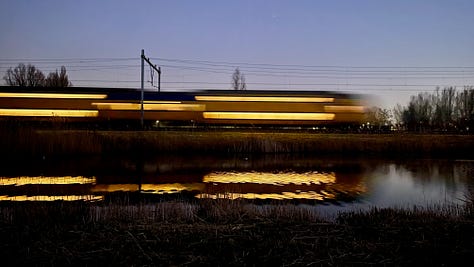

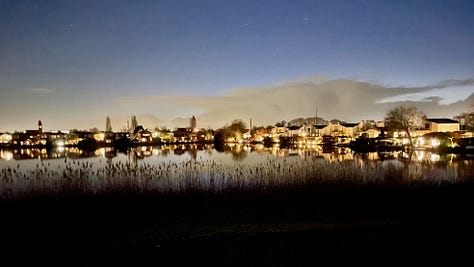
Located deep in De Wallen, within eyesight of the Red Light District, the Torpedo Theater is probably no bigger than my apartment, albeit with a higher ceiling. Lucy’s father owns the place and lets her use it for teaching and hosting book clubs. To stretch myself even further, I signed up for Lucy’s book club, too. There’s really nothing better than reading to improve a new language, and the books are thankfully always in makkelijke Nederlands - easy Dutch.
Het schrijvers gezelschap
For the class, every Sunday afternoon our society of seven students sat at an enormous table next to a tiny stage and improvised Dutch short stories in longhand – no screens allowed and no English allowed. (Iris is a bit of a stickler when it comes to speaking in English - verboden!) As a left-hander, writing in longhand is particularly difficult for me, but I persevered, writing quickly in my extremely messy, all-capital-letters handwriting, which I think I adopted from my mother, who always wrote in all caps.
The experience of writing in longhand brought back an intense memory (when I should have been paying attention to Iris speaking) of typing class from ninth grade. It was the first time the class had ever been offered at my high school, and performing this new way of making words with a jumpy electric typewriter felt like playing a tiny piano that fed a physical buzz back through your fingers with every keystroke. It was as if the keys anticipated your intention and leapt to attention as soon as they felt the static electricity from your fingertips brush up against the edged curves of the tiny, bowl-shaped keys. I was immediately sold. After that, I hardly picked up a pen again. But for this class, I embraced longhand because the teachers are both super cool chicks with excellent taste in literature and fashion – and they’re wholly committed to creating a unique experience for their students.
Sometimes, we walked around the neighborhood, taking photos of touristy Amsterdam with our phones to use as inspiration for writing exercises. We drank tea in copious amounts from a communal teapot. We ate pieces of dark chocolate and peeled mandarijn oranges while listening intently to each other read our work in international-flavored Dutch accents.
As someone who ultimately parlayed all of his high literature studies at university into a middling career as a marketing writer, I have to say that they should have charged more for the class. It was that good. But it was also extremely difficult and required hours upon hours of writing to deliver something I felt I could present as an actual story. It’s not easy writing in a completely new language, especially before you even understand how alliteration or rhyme works. It forces you to simplify, to write the most basic story you possibly can, without any foolish, fun frippery or clever framing. For me, that’s a real challenge.

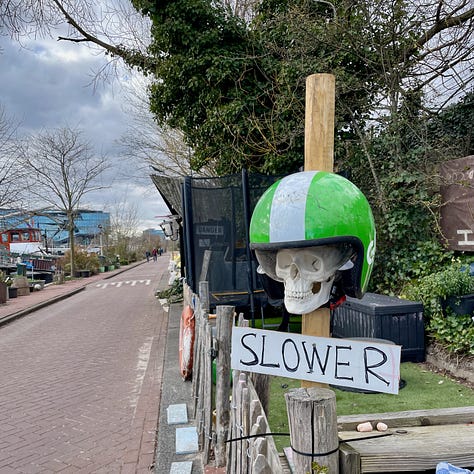
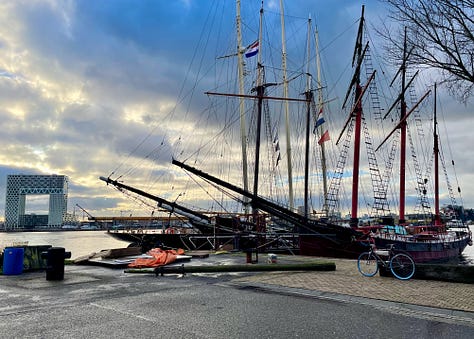
This wasn’t my first literature rodeo, but it was for some of the students. I was surprised at how good some of them were. It was ultimately a blast because we were all lovers of very short impressionistic stories, no matter where we came from or how old we were. Because our teachers created such a welcoming and fun environment – and perhaps also because we’re all expats with a few years under our belt as Amsterdammers but still unable to fully express the full range of experiences we’ve been collecting in our minds since we moved here – we were unafraid to trust each other. Trust is the most important aspect of any successful creative writing class. Without that, students aren’t motivated to make the serious time commitment. Good writing takes time, and it helped to have two Dutch muses like Iris and Lucy to pull us along. We had a festive borrel after class one day at a cool cafe, and they insisted on picking up the tab. Those drinks cost money, Iris! Another reason you should raise the price of your course.
When the theater wasn’t available for classes, we decamped to Iris’s balcony, deep in the Oostelijke Eilanden, the Eastern Islands. What a treat to see this neighborhood, a place I ride through multiple times per week, but now to see it from the fabled catbird’s seat, perched atop the terras of Iris’s four-story apartment across from the dome of De Oosterkerk, the Eastern Church. The bell rang hourly during class, reminding us as we turned our heads that we were committed to a higher power: literature. But also a reminder that our time is fleeting. Making it quick and snappy with that verbiage because we’re here to be performers, not posers.
Het eindproject
For our final project, we had to write a three-part short story. This is hard enough for people with busy lives to live, but there was an extra twist. We also had to film ourselves speaking one part of our three-party story directly to the camera, which was to be shown in class.
As anyone who really knows me knows, I am simply not good at following directions. I have to find a creative way of presenting my work, twisting the assignment to show that not only did I spend a lot of time on it, I spent a lot of time on research for the assignment. I can’t help it. I feel compelled to over-deliver. Otherwise, why bother?
However, I also despise being caught on camera, like a native tribe member deep in the Amazon forest who believes that cameras capture your soul. (Helaas denk ik dat het dat wel doet.) To talk myself into filming myself, I had to find a way to incorporate the process of filming into my daily rides. Every day in the week before the last Sunday class, I stopped at various places and recited the text of Act 1 of my short story De Neiuwskiosk. It’s about an immigrant fruit stand owner who, after many years of decreasing success, decides to finally give up selling fruit and hand the stand over to someone else. But to whom? And for how much?
As is often the case on my rides, the wind did not want to cooperate, but I was able to edit together something that worked well enough. I present ‘Act 1’ to you in its unvarnished form, with the caveat that creative writing classes are about taking big risks, publicly, presenting a first draft of something you’ve spent hours or even days on to a handful of students who will experience it only for a few brief minutes, assuming they aren’t day-dreaming about typing class in ninth grade. These stories will never be fleshed out, and may only be half-remembered, even by the people who wrote them. A bit of improv for the literati.
If you’re lucky, improvising in this way – on camera, in a second language, in front of curious tourists and locals – hopefully it won’t actually steal your soul. If you do it in Dutch, only your teachers will ever know if it’s actually any good.
Het wordt beter
Of course, whether the output of these exercises is objectively goed of niet zo isn’t the point. What’s most important is that I’ve been doing the work, and it’s finally starting to pay off. (Eindelijk!)
For example, I just spent the last three days on a bike tour of Limburg, straddling Belgium and the Netherlands, and I spoke to almost everyone I met on that trip entirely in Dutch. When I presented my ticket on the train, I did it in Dutch. When I asked other travellers to move their asses and their luggage so I could put my bike in the designated bike spot, it was in Dutch. When I stayed at a bed and breakfast one night after an extremely long 80 km ride on my shitty old single speed bike that has seen all twelve Dutch provinces and now two Belgian ones, I spoke to the owners and the other guests at breakfast entirely in Dutch. I still have a long way to go, but I can finally be mostly understood by patient strangers. Dat voelde echt goed.

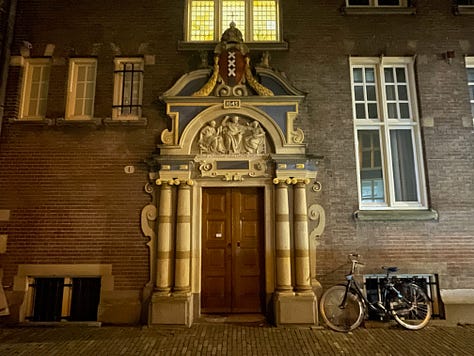

Tonight, back home again after my Tour de Limburg, I attended a book signing party for the release of my former Dutch teacher Marjan Ippel’s new book, Nederlands is Zooo Makkelijk, which I now possess a signed copy of. The book is a collection of vignettes, presented in both Dutch and English, about her experience as an echt Amsterdammer teaching Dutch to expats. She highlights, through the conversations she and her students engage in during class, interesting aspects of Dutch language and culture that are changing and evolving, perhaps because of immigration… or perhaps not. After all, as she points out, this place has always been a place of immigrants. The language and culture of the Dutch has absorbed as much from outside as it has projected out onto the world, which is itself quite significant once you learn about it.
Upon opening up her book and turning the pages, I could immediately see that it’s a unique snapshot of a time and place where I happen to live – like, right now. The setting is literally a neighborhood away from me, in the same classrooms I’ve been sitting in for the last few years. The characters are just as clueless and insightful as I am about the Dutch. Like me, Marjan is a former journalist cast adrift by the tides of tech now that newspapers and magazines are ancient history. Like me, she writes about her experiences in a newsletter, and like me, she’s a parent. Zooo natuurlijk, I want to see her succeed. What a pleasure (wat leuk!) to see a fellow reporter of small-scale histories find success minting careful observations about life to create a publication that captures and represents a particular time and place. It also has oodles of observations about important Dutch phrases and norms that will help me become een echt Nederlander. As I thumb through the pages, I wonder, “Am I in the book?” I can’t wait to find out.
Wat fijn om je te zien
At the party, I grabbed a glass of bubbles and a few bitterballen and started chatting with Marjan’s friends and family and admirers. Looking around, I slowly realized that more and more of my old classmates were filtering in, all of them speaking Dutch. Wat fijn om je te zien! Hoe gaat het met je?! All of us dropped right back into Dutch-only mode. I only heard a few snippets of English the entire time.
That said, I noticed that some of my old classmates who I thought were far ahead of me when we finished our classes haven’t progressed as far as I have since then. It’s hard to find the time. They weren’t sure what to do next. Some of them are still plugging away by consuming Dutch TV shows and podcasts. All of them are progressing, in their own ways, slowly but surely. But all of us know that ultimately, the only thing that will make us truly fluent is to dive into the deep end. Those who marry Dutch people have it so easy! If that’s not you, then you have commit to finding other people who are just as lost, but just as driven, as you are.
I recommend becoming a volunteer, perhaps somewhere that’s a short bicycle ride away. Somewhere cool and interesting, where they only speak Dutch. For example, a community garden underneath my balcony or a kitchen that feeds the hungry. This is your chance to become a character in a community story, like that funny old American man who used to gesticulate wildly when he got excited and always mixed up makkelijk and moeilijk.
He didn’t know easy from hard. But he was a good bartender.
Furthemore…
The bike rides can’t stop and won’t stop. Cycling is always my first priority, and the time I spend on my bike takes away from everything else that I want to accomplish (like writing in English). I’ve been out there nearly every day for months, surveying the landscape and watching the seasons change. The wildflowers are blooming along the fietspadden, the leaves are growing op de bomen, and when I’m out there in the polders I feel like I’m living life right. For that kind of commune with nature, you need a good playlist.
For that purpose, I compiled a very solid playlist called ‘The Dutch will continue until Het Nederlands improves’, which is available on Apple Music or Spotify. The most notable song on this collection is by my friend Samuel Aaron, who just released his debut album, which I’ve already ordered on vinyl. This kid - along with my nephew Jake – stayed with me a few years ago, and they tore up this town like it’s supposed to be torn up (from the floor up). And they did it all on bicycles. Hanging out with these young creative geniuses gave me renewed hope for the next generation of artists and musicians. Since then, Jake has been in New York composing an insane comic opera while Sam has been doing the very difficult work of touring around parts of the US outside of his home in Chicago and building up his busking chops, which has culminated in a legit album of material that I have to say is legit good. If you know me, you know that I do not praise people unless I mean it. Unless they deserve it. Sam’s song ‘Squirrels in the Walls’ is on my playlist, although it’s a song from a different album, one that he made with a friend. Like literal squirrels in the walls, it deserves your attention. Sam is also putting himself out there with a newsletter. Mad respect.


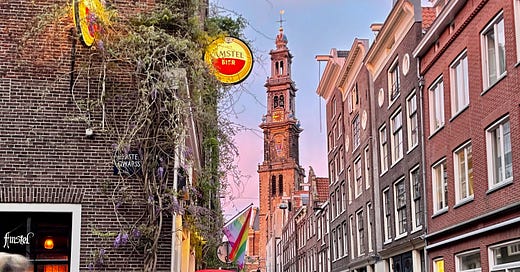



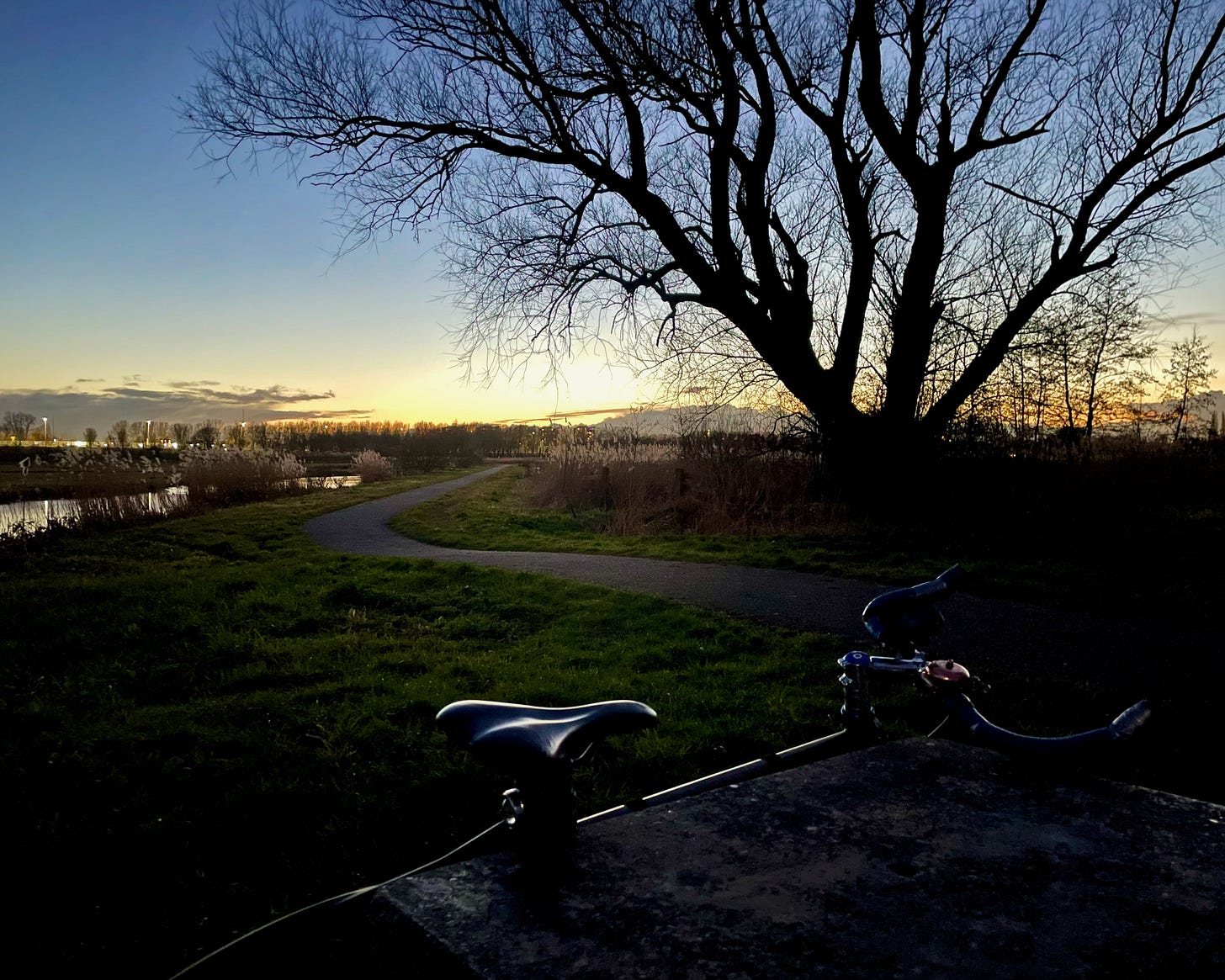


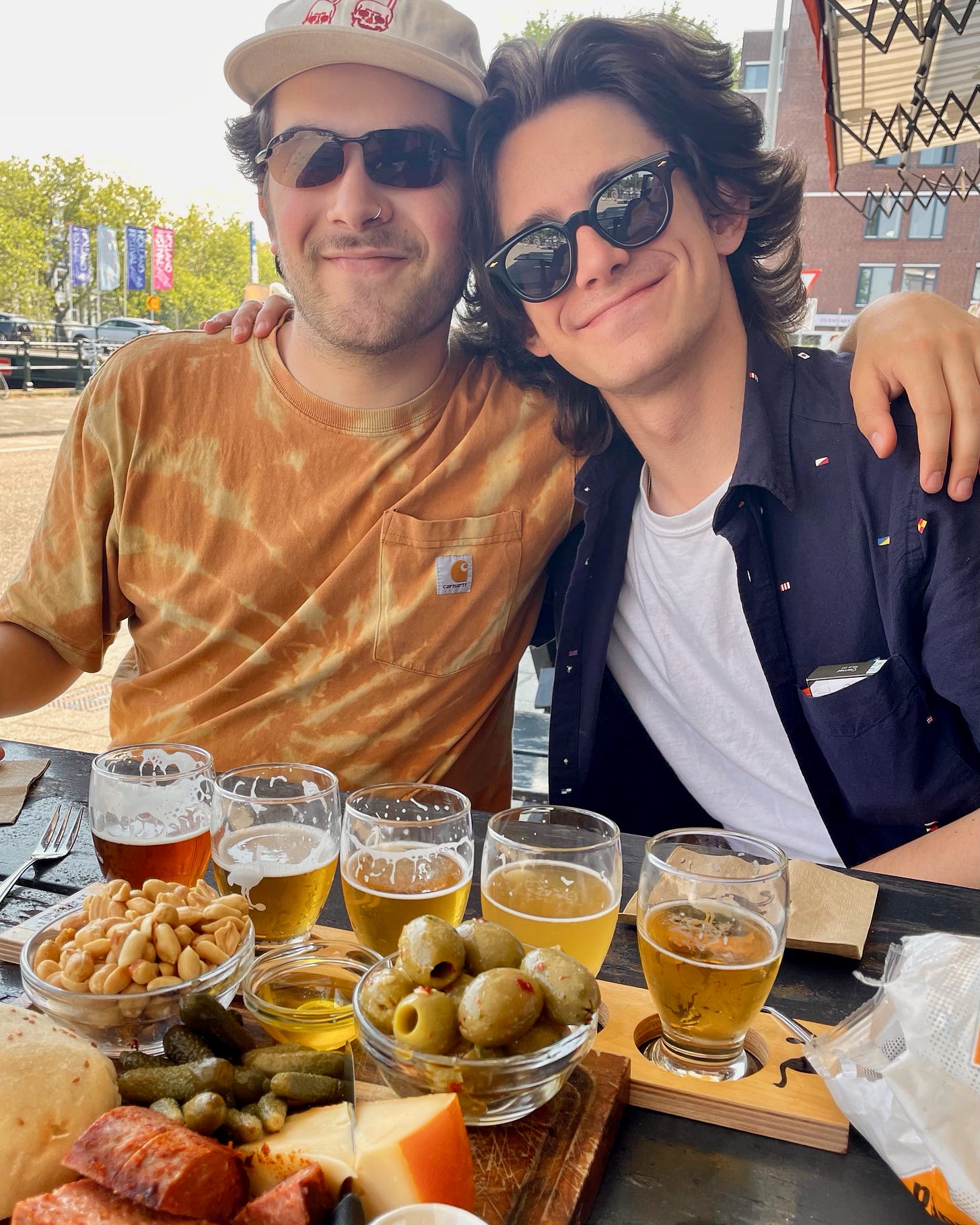
Since coming back to the US many years ago, people would ask me, do you speak Dutch? Say something in Dutch? And then look ever so put out that I seemed to be speaking English with a funny accent. It's an easy language that is very hard to learn! The trick seems to be to find people who are just too dang tired to bother with English. My mother had a friend who would say laten ons in Nederlands praten--ik ben taal moe.
Anyhow, this is how my mom became fluent: She did Tafeltje Dekje op de fiets. Good exercise, and you meet your older neighbors who will happily tell you stories and they will be too darned over it to bother with English.
Love the newsletter!